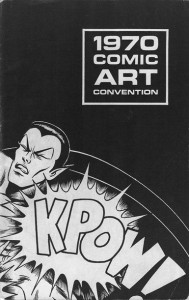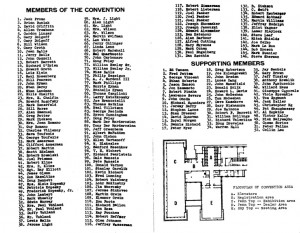Follow Scott
Recent Tweets
- Waiting for Twitter... Once Twitter is ready they will display my Tweets again.
Latest Photos
Search
Tags
anniversary Balticon birthdays Bryan Voltaggio Capclave comics Cons context-free comic book panel conventions DC Comics dreams Eating the Fantastic food garden horror Irene Vartanoff Len Wein Man v. Food Marie Severin Marvel Comics My Father my writing Nebula Awards Next restaurant obituaries old magazines Paris Review Readercon rejection slips San Diego Comic-Con Scarecrow science fiction Science Fiction Age Sharon Moody Stan Lee Stoker Awards StokerCon Superman ukulele Video Why Not Say What Happened Worldcon World Fantasy Convention World Horror Convention zombies
©2025 Scott Edelman
You never forget your first con
Posted by: Scott
Tags:
conventions
Posted date:
June 13, 2008 |
No comment
I made my plane reservations for San Diego this week to attend Comic-Con International, which inevitably set me to thinking about my first comic-book convention, back when I was 15. It was the 1970 July 4th weekend Comic Art Convention, organized by Phil Seuling and held in Manhattan at the Statler Hilton Hotel. That was when I was just a fan, years before I got a staff job at Marvel Comics or freelanced for DC Comics, and decades before I edited Science Fiction Age magazine or went to work for the SCI FI Channel. I still have the convention program book, which you can see below with its cover drawing of the Sub-Mariner by his creator, Bill Everett.
Conventions were a heck of a lot smaller back then. As you can see from the two-page spread below, at the time the program book was printed, the con had only 146 attending members and 52 supporting members. Even if there were a few hundred more memberships sold at the door, that’s still a far cry from the approximately 150,000 members of last year’s con in San Diego. But though this list is small, it’s remarkable how big an affect members of this group ended up having on my life. Even though I don’t think I met any of them face to face that weekend and wouldn’t until years later in some cases, many of these people intersected with my life in important ways.
For example (and I’ll be brief as I move numerically down the list, even though many of these people are deserving of lengthy individual essays):
Twelve years later, Gordon Linzer (#5) would publish a short story of mine in the magazine Space and Time, for which he was both editor and publisher, and the following year he would print a second tale, which was later adapted into an episode of the TV series Tales From the Darkside. And 20 years later, in 1990, he would publish my novel, The Gift, which ended up as a finalist for the Lambda Award.
After my six-year stint working for both Marvel and DC Comics, when I was completely burned out and dealing with what had turned into a love/hate relationship with the field, I would write an essay titled “Stan Lee Was My Co-Pilot” in my efforts to try to understand the experience. Fourteen years after that first convention, Gary Groth (#9) would publish it in June 1984 in The Comics Journal #99. It became the first of half-a-dozen Ethics columns I would write for him, inspired by a similar series then running in Esquire magazine.
When I was 12 or 13, several years before that first convention, and my mother thought I had too many comic books, I inventoried them and sent a list to Howard Rogofsky (#24), who advertised back then in TV Guide. He was the best-known comic-book dealer of the time. Rogofsky bought a collection that would have included Amazing Fantasy #15, Spider-Man #1, X-Men #1, Avengers #1, and so on, for prices which would now make you weep. Considering that in the early ’70s, we all made fun of someone willing to pay $20.00 for Fantastic Four #1, and that at the 1970 convention, a pristine copy of Action #1 was unable to get an opening bid of $325 at auction, you can just imagine how low the total price had to have been. And you know what I did with my profits? Why, buy more comics, of course!
If not for Mark Hanerfeld (#25), I’d never have attended a convention, worked in comics, or met my wife. He wrote a column that appeared in DC Comics in the late ’60s which reported on fan activity, including his own fanzine On the Drawing Board (the title of which was later changed to The Comic Reader, after which it was sold to Paul Levitz, currently the president of DC Comics). I mailed him what must have been a quarter for a sample copy, which opened me to a whole new world. I’d hoped to attend the 1969 Phil Seuling convention, but at 14, couldn’t figure out a way to pull it off.
Twenty-six years after that first convention, I would take over from Robert Martin (#37) as the editor-in-chief of Sci-Fi Entertainment, which was then the name of the official SCI FI Channel magazine.
When I lived in Brooklyn, an out-of-towner moved to my neighborhood (in 1973, I think), and when the local kids saw him unloading many boxes of comics, they told him about the other strange collector in the neighborhood, me. And so although we’d never encountered each other at that 1970 convention or any other, I would finally meet Duffy Vohland (#55), who encouraged me to apply for a job as Associate Editor of Marvel’s British reprint books.
Marvin Wolfman (#64) would eventually be one of the many editors-in-chief I worked for during my years on staff at Marvel Comics. But Len Wein (#65) would be the first editor-in-chief I worked under when I moved from working in Marvel’s British department to take a position as an Assistant Editor on the American titles. He would let me write the Bullpen Bulletins pages and eventually gave me my first chance to write comics.
Four years after the con, I would meet the sister of Ellen Vartanoff (#93)—Irene Vartanoff—on my first day of work at Marvel Comics. I never bumped into Ellen at that con, but she’s now been my sister-in-law for 32 years.
Martin Greim (#108) edited and published the fanzine Comic Crusader, the second fan publication I learned about through Hanerfeld’s columns in DC Comics. Not only did I subscribe, but Greim eventually published some of my letters, and I was encouraged to publish a fanzine of my own.
Sixteen years after that convention, Mary Skrenes (#128), along with Steve Gerber, would go on to co-create Omega the Unknown. Eventually, I would script a fill-in issue.
Many more names would come to have meaning—Alan Light (#60), Joe Brancatelli (#82), Mark Evanier (#145), and others—but of course, I knew none of this in 1970. All I knew was, man, did I love comic books. And to find myself in a room with others who felt the same way—whether there were 150 or 150,000 of them—all that mattered was that I was suddenly not alone.


